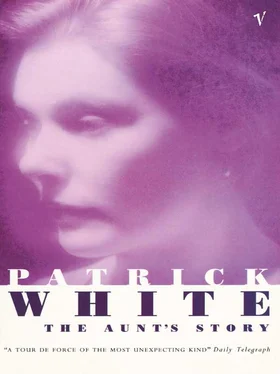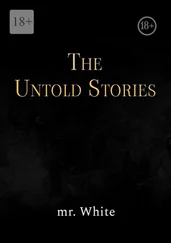Walking through the back door, which, she remembered, was the way Holstius had come, she went amongst the trees. They were of a deciduous variety on that side of the house, still green, but washed out, exhausted by the summer. Her feet sank in the soil before water, which trickled out of tufted grass, to fill and overflow from a rusted tin. She took the brown water, burying her face in hands and water, till it ran down, and afterwards, in rivulets, in devious directions, under her dress, against her skin. The water made her laugh. She looked at the world with eyes blurred by water, but a world curiously pure, expectant, undistorted. She could almost have read a writing on the bark of any given tree.
Later Theodora returned to the house, and in a fit of comfortable conscience brought an old iron bowl that she had seen on a shelf, to fill, to clean the floor of her house. Because Holstius would return some time during the day. She knew. In this she was positive. In fact, she shaded her eyes already against the blue smoke, rising from the valleys and creating a distance. She looked through the trees for the tree walking, which in time would become Holstius. She smiled to herself as she anticipated the recognition of his kind eyes.
But in the meantime she made a widening lake on the board floor of the house, spilling the water generously from the iron basin at her waist. Then without soap, she began to scrub the boards with an old brush. This way she had a certain affinity with the women in houses. She approached close, but respectfully, to the wood, so that she might appreciate its ingrained humility and painful knots. If Holstius had returned at that moment he would have approved, to see her as simple and impervious as a scrubbed board.
Instead, a car came, groaning over stones. Theodora sat on her heels, raising her arm and the scrubbing brush for protection. The car stopped. She heard its abrupt door. She could not sense that this was in any way connected with Holstius. There was anger and exasperation in the dead grass, also a slight diffidence, almost fear, as feet covered the distance to the house. Theodora sat with the scrubbing brush upraised, and her thin mouth. If they intended to break open her peace of mind, from curiosity, or out of malice, she was prepared to defend.
‘Well, for goodness’ sakes!’
It was Mrs Johnson. Her sandy hair, hatless, blew at the window sill. Her colourless but anxiously friendly eyes shifted a little to avoid what she might have to see.
‘Oh, it is you,’ said Theodora, lowering the brush.
She could not help but love the practical face of Mrs Johnson, which for the moment, at least, was practically helpless. This was not a situation which Mrs Johnson could touch, or to which she could apply a poultice.
Then Mrs Johnson jerked her head, and laughed, and grasped the window sill, and said, ‘That was a nice thing you did, Miss Pilkington. Walking out on us. I’d got the sheets out, ready to fix your bed. You left your hat too.’
‘It was not very polite,’ Theodora admitted.
The sky was intensely blue and majestic behind Mrs Johnson’s pathetic head.
‘I should say,’ said Mrs Johnson without malice.
She took a breath and came round so that she stood in the doorway.
‘Lucky the kids spotted your tracks this morning. She’s gone further up the road, they said. So I said I’d run on up an’ see. Before I took the milk.’
Theodora got on her feet to match Mrs Johnson in an attitude of neighbourly intercourse.
‘That was kind of you,’ said Theodora. ‘But …’
‘Joe had a hunch you might have looked in here,’ Mrs Johnson said. ‘We hoped . For your own sake.’
She began to look round the room for something to tell her husband.
‘My, though,’ she said. ‘I guess you were lonesome.’
Theodora touched the gentle ash with her toe.
‘I made a fire,’ she said. ‘I am very happy in this house.’
Mrs Johnson frowned resentfully. She resented Theodora’s state of mind, because it was something that she could not understand. Now she shifted round for words, to resist the slow silence of the dead grass.
‘Maybe for a vacation,’ said Mrs Johnson with a tight bright laugh. ‘If your tastes lie this way.’
She looked round again at the exasperating house. She looked for some object, from out of the circle of her own life, with which to make an alliance, but all she found was the old iron bowl. This, in connection with Theodora Goodman’s obsessive act of scrubbing, was so obscene that her eyes retreated.
‘Well, now, Miss Pilkington,’ she said, ‘what are we gonna do? I got the milk to run to Martins’. Then I am at your service. I suggest you come on down to our place. It’s brighter there. And comfortable. I’ll fix some dinner for you. We got steak for dinner,’ she said.
All this was said and said, Theodora realized, because Mrs Johnson dared not stop. Mrs Johnson would not know the great superiority of stationary objects.
‘Oh, no,’ said Theodora flatly and kindly, and because she was touched by the suffering face of Mrs Johnson, she added, ‘Thank you.’
‘But you can’t stay here !’ said Mrs Johnson. ‘Alone. In this darned old shack.’
Theodora saw how Mrs Johnson’s soul would have winced and contracted in a similar situation. This was why Mrs Johnson had to protest, why she stood firm, with her bare, sandy legs slightly apart, and tried to wrench the soul of Theodora Goodman into her freckled hands.
‘I can,’ Theodora said. ‘I can stay here perfectly well.’
Because she firmly intended that this game for the soul of Theodora Goodman should be finally hers.
‘Besides,’ she said, ‘I expect that Holstius will come back, if not this morning, some time during the afternoon.’
‘Holstius? Who the hell?’ Mrs Johnson said. ‘Why, his name was Kilvert!’
‘I don’t know about that,’ said Theodora.
And it was unimportant.
‘Yes, Kilvert went out to the coast eighteen months ago. Shut up the place. Didn’t say when he was comin’ back. Folks in town heard that Kilvert died.’
Then Mrs Johnson stopped and turned something over in her mind.
‘We don’t seem to be gettin’ nowhere at all,’ she said at last.
Theodora lifted her eyes to see whether Mrs Johnson’s face was being sly. It had adopted that fatal flatness which is never quite a disguise.
‘Well,’ it said, ‘I got work to do.’
And Mrs Johnson was going out of the door. She walked with long steps over the grass towards the car, of which the bonnet still shimmered, its metal surface broken by a haze of heat. So that Theodora was alone. She embraced with love the silence of her own room. And soon Holstius would come.
‘Miss Pilkington?’
It was Mrs Johnson again. She came back. She was carrying a loaf of bread and a small iron can.
‘Guess you’ll need these,’ she said. ‘Whatever else.’
Theodora took the things, because it made Mrs Johnson better to give. She had a talent for freckled children. But some, it seems, turn out dark.
‘How is Zack, Mrs Johnson?’ Theodora asked.
‘Zack? Why, Zack’s okay. He’s a slow boy, but good.’
She had some difficulty with the door of the car, so that she had to raise her voice.
‘Not so quick by half as the other kids. Not so intelligent,’ she said.
Something occurred to her that never before. She turned on Theodora Goodman a look of dubious dismay, of sudden helplessness. Then she gathered her long legs into the car and drove off.
The mountain began to relax after Mrs Johnson had gone. It pricked with insects. A cone fell. You could hear the wings of birds parting the heat.
Theodora stood by the window. The struggle to preserve her own instrument for some final, if also fatal, music that Holstius must play, had been at times difficult and unpleasant, but at least it was preserved. She looked out. She was conscious of the immensity of her own possessions, her blaze of blue. Now she could eat the bread, as a concession to Mrs Johnson. She put the pieces in her mouth, wiped the crumbs off, drank the milk from the lip of the little can. But in performing these acts, she continued to look out of the window, at the secretive pines and the disappearing road. If she had had a watch she would have looked at it, to measure her anxiety. Because she was afraid that Holstius. She was afraid. She was afraid of something that Mrs Johnson had begun.
Читать дальше












